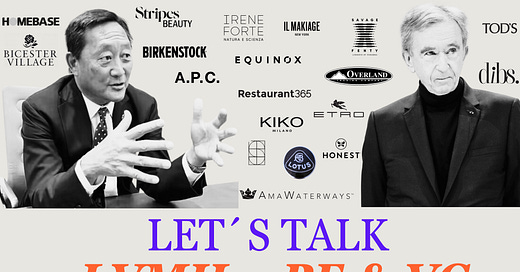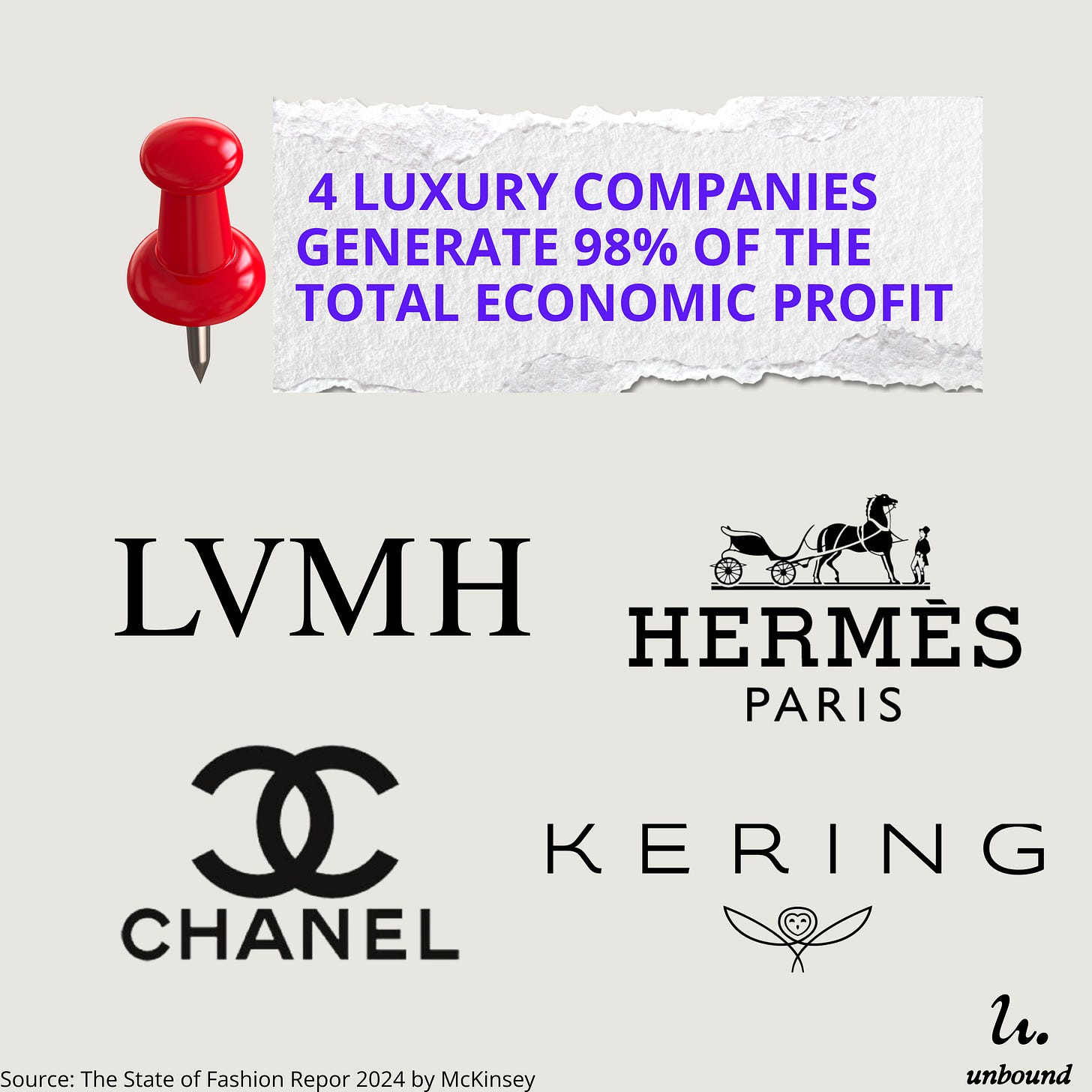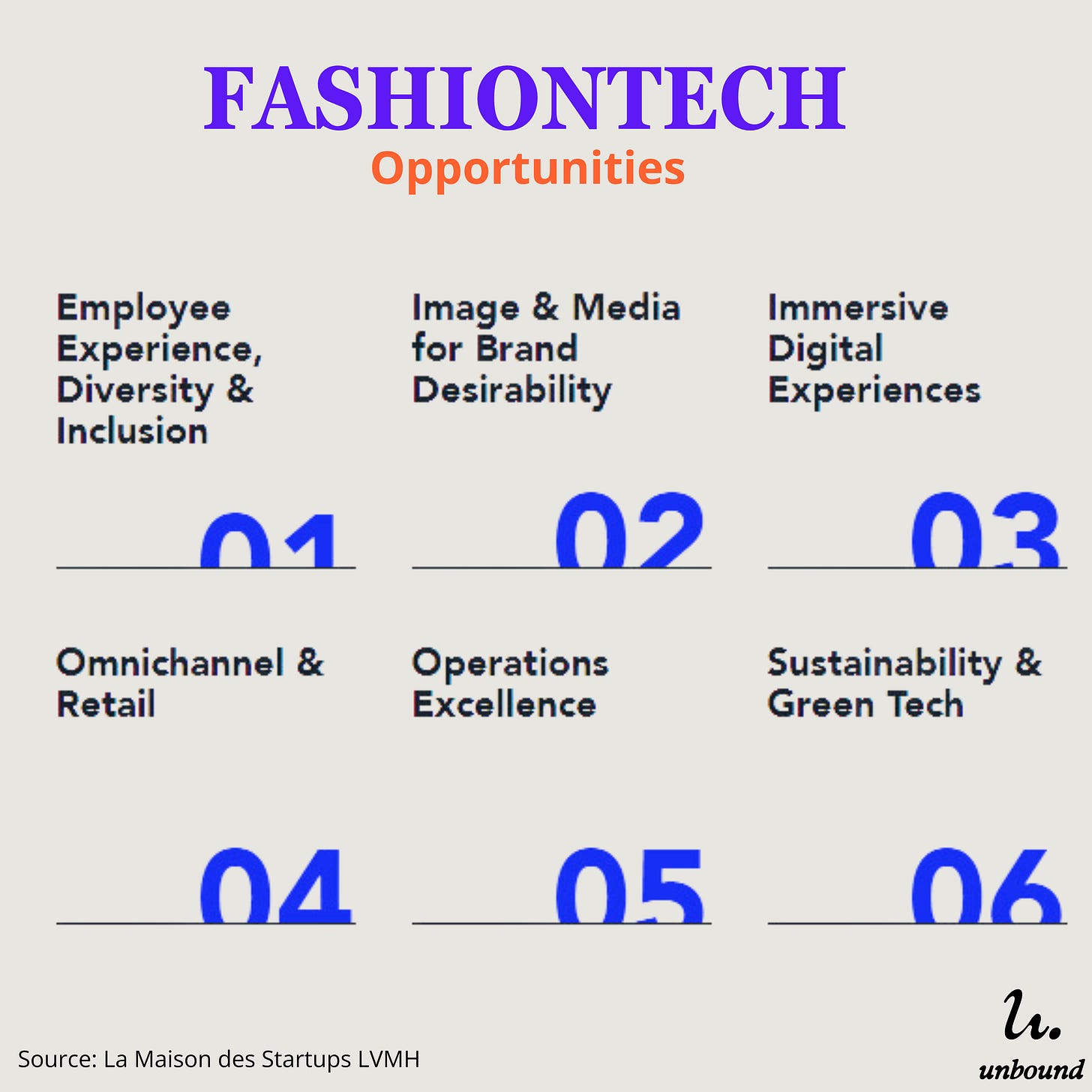The Illusion of Choice: The Democratization of Fashion
Since the 1980s, fast fashion has made certain brands more accessible, generating positive and negative effects.
On the positive side, we feel prettier, sexier, and more included.
On the downside, we’ve become more dependent on consumption.
But is there democratization on the business side of fashion?
In my research, I discovered that the business of fashion has actually become less accessible to outsiders. Information is heavily gatekept, and this concentration of knowledge and power was my “aha” moment.
Once I started digging deeper, new questions emerged. That's the purpose of Unbound.
"Human behavior flows from three main sources: desire, emotion, and knowledge." Plato
The Numbers Speak Volumes:
There is compelling data that the fashion industry is increasingly concentrating on a few powerful players astonishingly.
This dominance reshapes market dynamics, creating significant barriers to entry for outsiders and smaller companies. This dynamic is not good or bad—it’s just reality. Knowing the lay of the land is important for identifying new opportunities.
This dynamic pushed me to write my first article about LVMH - as the best example of the power of the few in the fashion industry.
Down the LVMH rabbit hole, I discovered the less visible side of their empire, which I am excited to share with you.
I hope you enjoy a glimpse into LVMH’s private equity and venture capital investments and the connection with Agache (formerly Groupe Arnault) - Bernard Arnault's private investment company and family office.
A reach that extends well beyond their “natural” domains.
LVMH has diversified into other asset classes, such as private equity and venture capital, through the following ways:
I. Private Equity: L Catterton
Originally founded in 1989 as Catterton-Simon Partners, L Catterton was established in January 2016 through a partnership between Catterton, LVMH, and Groupe Arnault, effectively grouping all three’s private equity operations across the Americas, Europe, and Asia.
Why is L Catterton relevant?
It is the world's largest consumer-focused private equity firm, with approximately $34 billion AUM. LVMH owns a 40% stake.
Thesis: dedicated to growing middle market companies and emerging high-growth enterprises.
Approach: hands-on strategy with comprehensive strategic, operational, and management guidance.
Geographical focus: North America, Europe, Asia, and Latin America.
Portfolio: 52 majority-ownership companies and 92 firms with minority-ownership.
L Catterton wins:
Its special relationship with LVMH and its family of brands gives the fund an edge by actively collaborating in consumer insights, brand strategies, retail expansion, and economies of scale across the collective portfolio.
LVMH Reigns:
This partnership allows LVMH to leverage L Catterton's expertise in identifying and nurturing emerging consumer brands. These brands can complement and enhance LVMH's existing luxury portfolio. The partnership helps reduce competition and increases LVMH's market share control.
Additionally, it offers a better understanding of consumer behaviors across multiple price points and the capacity to anticipate consumer needs and legislations while delivering faster.
In the graph below, you can appreciate the magnitude and scope of their reach:
“Our steadfast mission is to create success; as investors, this means delivering outsized returns and creating value in the businesses with whom we partner. ” J. Michael Chu & Scott Dahnke, CEOs of L Catterton
The Role of Technology in Fashion's Future
The fashion industry is complex and heavily dependent on consumer confidence, economic conditions, and shifting consumer behaviors.
And now, more than ever, it must adapt to technological advancements. While technology implementation can be complex, expensive, and painful for large conglomerates, its rapid implementation has become non-negotiable today.
Consumers are increasingly focusing on value, sustainability, and transparency, driving brands to adopt eco-friendly practices and ethical sourcing.
The rise of omnichannel shopping has led to a seamless integration of physical and digital experiences. Influencer dynamics are shifting towards authenticity and relatability, with platforms like TikTok gaining prominence.
Companies like LVMH recognize this dynamic.
And respond by aggressively wading into the entrepreneurial ecosystem to stay ahead.
LVMH, alongside peers such as Chanel, Inditex, and Nike, has established Open Innovation divisions, venture capital funds, acceleration programs, and extensive networks to meet consumer demands for sustainability and personalized experiences.
LVMH’s Entrepreneurial Ecosystem
At the heart of LVMH's strategy are its Digital Hubs, designed to explore and implement cutting-edge technologies that enhance luxury experiences, drive sustainability, and improve operational efficiency.
These hubs unite digital experts, data scientists, technologists, and business leaders to collaborate on innovative projects, ensuring that new digital solutions are tailored to each brand's specific needs under the LVMH umbrella.
In very simplistic terms, there are three essential pillars within the LVMH entrepreneurial ecosystem.
For those new to these initiatives, let me briefly explain:
Open Innovation
Open innovation is all about teaming up with others to generate new ideas. Instead of relying on their R&D, companies tap into the brains of startups, customers, and universities. LVMH's open innovation initiative fosters collaboration between its Maisons and innovative startups. Central to this initiative are two key programs:
La Maison des Startups: Launched in 2018 at the Station F startup campus in Paris, this business accelerator welcomes 50 international startups annually. It aims to co-create new services and products by facilitating close collaboration between LVMH Maisons and startups.
DARE (Disrupt Act Risk to be an Entrepreneur): an intrapreneurship program encouraging LVMH employees to propose and develop innovative business `solutions. This platform allows talents from across the Group to share ideas supported and accelerated through startup methodologies and mentorship.
LVMH Luxury Ventures:
LVMH's dedicated corporate venture fund invests between €2-10 million in stakes in fast-growing luxury companies. Created in 2017, it focuses on making smaller-scale investments in promising startups, particularly luxury brands and companies relevant to LVMH's business areas.
Key investments include Stella McCartney, Heat, Lusix, and Gabriela Hearst.
Agache (Formerly Groupe Arnault):
Agache is Bernard Arnault's private investment company and family office. Its diverse and expansive investment strategy focuses on established businesses and emerging startups. Its focus areas include arts and culture, real estate, media and publishing, and private equity and venture capital.
Agache’s investments are a great fit with LVMH’s operations, allowing for strategic collaborations and the use of valuable consumer insights and brand strategies. They reduce risks by spreading investments across different sectors and regions while tapping into new growth opportunities.
By focusing on technology and innovation, they stay ahead of emerging trends, ensuring they remain relevant and grow in an ever-changing market.
We’ve already discussed L Catterton, its private equity arm. So, let's examine its venture capital strategy, led by Aglaé Ventures.
Aglaé Ventures:
Backed by Groupe Arnault (Bernard Arnault's family office), Aglaé Ventures invests from €100k to €100m in tech companies at all stages. It is particularly interested in marketplaces, SaaS, content platforms, and digital native brands, having participated in 65 funding rounds worth $3.4 billion.
Selected investments include Photoroom, Spotify, Airbnb, Certa, and New Tales.
As I write this article, I see great economic uncertainties and challenges. Capital is scarce and expensive in the entrepreneurial ecosystem.
However, there are tremendous opportunities for ventures to build resilient companies that are essential for the future.
For example, La Maison des Startups offers invaluable insights into key investment areas within the industry, making it an outstanding resource for founders.
Both companies and consumers need deep changes, technology, outsiders, entrepreneurs, and investors to bring about positive change in the fashion world.
“The world of technology thrives best when individuals are left alone to be different, creative, and disobedient.”
Don Valentine, Founder of Sequoia
Key Lessons:
I take three important learnings as an investor and entrepreneur:
Having a competitive edge and a diversified strategy is crucial for investors in both private and public markets.
Significant opportunities exist to create great companies in the fashion industry by solving some of these giants’ pain points more agilely and efficiently. Areas ripe for innovation include supply chain innovation, sustainability, and AI (personalization, design, supply chain, marketing/trends, authenticity, among others).
These are uncertain economic times, and although scary, it could be an exciting time to build.
“Competition is less fierce. Your customers are getting fewer random cold emails from startups, so a note from you will be more intriguing. There’s fewer pitches going to investors, and fewer content collaboration pitches going to podcasters and creators. This means response rates will be higher, and people will be more willing to partner.” Andrew Chen, General Partner at A16Z
As a successful entrepreneur, your exit path will probably be indirectly or directly associated with one of the fashion giants, especially as some PE funds are risk-averse to fashion.
Startups to Watch:
Headway: makes mental health care accessible by connecting patients with therapists who accept insurance, reducing financial barriers. They simplify admin tasks for therapists and expand their network. Recently, they raised $100 million in a Series D round led by Spark Capital, boosting their valuation to $2.3 billion. They plan to expand into Medicare Advantage and Medicaid.
Hedra: is revolutionizing video creation with Character-1, an AI tool for making animated, expressive characters. They recently raised $10 million in a seed round led by Index Ventures. Hedra's AI is a game-changer for fashion brands in product presentation, marketing, and customer engagement.
Nak3D: a Swiss AI startup helping brands, e-commerce sites, and designers cut costs and reduce waste. How? They transform URLs or PLM data into 3D models in about a minute—no more physical prototypes needed. They whip up shareable content for digital platforms and games in seconds, skipping the hassle of photo shoots. Plus, they integrate everything into your metadata for seamless inventory management and easy decision-making.












Woww! This article is a masterclass! It’s fascinating to see how they not only dominate the luxury sector but also shape the future of fashion through strategic investments. Eager to read more from you!